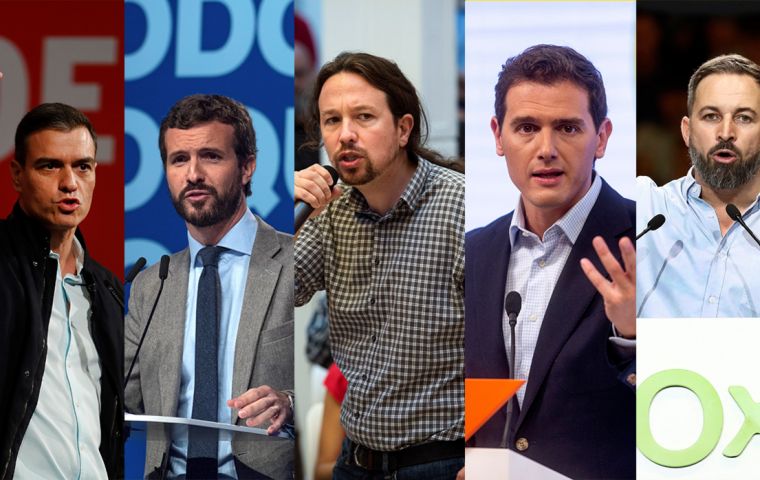MercoPress. South Atlantic News Agency
Spain votes on Sunday: Catalonia and a possible repeat of a hung parliament
 Opinion polls suggest a third of voters are still unsure who they will vote for on Sunday, meaning Monday's tense televised debate could be decisive
Opinion polls suggest a third of voters are still unsure who they will vote for on Sunday, meaning Monday's tense televised debate could be decisive The main candidates to become Spain's next prime minister clashed on Monday over how to handle Catalan separatism, as they tried to woo voters ahead of a repeat election that opinion polls show could be as inconclusive as the one in April.
Opinion polls suggest a third of voters are still unsure who they will vote for on Sunday, meaning Monday's tense televised debate could be decisive. At this stage, polls point to a stalemate, with no party or bloc of parties having a majority.
Catalonia's regional capital, Barcelona, has been rocked by weeks of sometimes violent protests since nine separatist leaders were sentenced to jail in mid-October for their role in a failed independence bid.
“You don't believe in the Spanish nation,” the leader of the conservative People's Party (PP), Pablo Casado, told acting Prime Minister Pedro Sanchez, accusing him of being too soft on the Catalan separatists.
Sanchez, a Socialist, is leading in opinion polls but has lost some support, while right-wing parties have grown more popular since last month's rallies in Catalonia saw some protesters wreak havoc and throw Molotov cocktails at police.
Right-wing parties are now competing on which would take a harder line on the restive region, hoping to attract more votes on Sunday.
“There's a permanent coup d'etat in Catalonia,” said the leader of the far-right Vox party, Santiago Abascal, saying PP and the Socialists, which have dominated Spanish politics for decades, were both to blame.
Vox won its first parliamentary seats in April and opinion polls show that boosted by anger over Catalonia protests, it can now hope to become the third-biggest party with more than 40 seats, up from 24 in the previous ballot. There are 350 seats up for grabs.
Spanish voters saw Sanchez as winning the TV debate, with Casado second, a flash opinion poll of 711 people by Invymark for LaSexta television showed. The poll also saw Abascal benefiting from the debate.
Sunday's parliamentary election will be the fourth in four years for Spain. New parties have emerged after the financial crisis, fragmenting the political landscape and making it much harder to form governments with stable majorities.
Polls carried out by GAD3, Sigma Dos and NC Report and published on Monday pointed to the Socialists winning but falling short of a majority, with their numbers likely dropping to about 120 seats from the 123 they won in April.
PP would get more seats than in April, while the liberal Ciudadanos would be the most damaged by the repeat election.
All possible scenarios for deals to form a government are fraught with difficulties. Sanchez on Friday ruled out forming a “grand coalition” with PP.




Top Comments
Disclaimer & comment rulesCommenting for this story is now closed.
If you have a Facebook account, become a fan and comment on our Facebook Page!